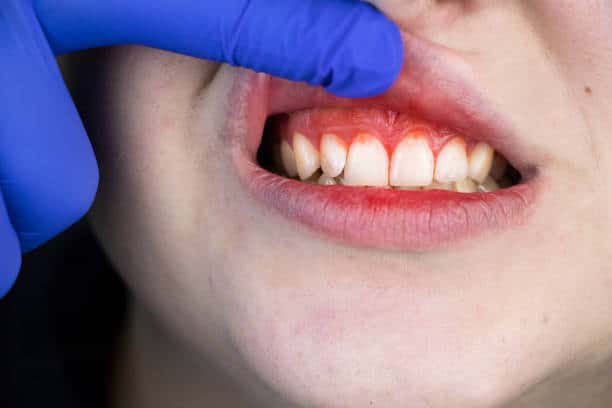Periodontal Disease – Can it be Cured?
This is a question we are often asked. Let’s take some time to dig into this to learn more about periodontal disease (gum disease), treatment options, and long-term outlook for someone suffering from periodontal disease.
What is periodontal disease?
Periodontal disease is gum disease- or disease in the soft tissues surrounding your teeth. It is a common problem that is more likely to happen with poor oral hygiene, and to get worse as you age. You can be more prone to develop gum disease if there is a history of it in your family or if you have certain diseases, hormonal changes/conditions, or are a smoker. It affects almost half of adults over age 30, and 70% of adults over age 65 in the United States. It starts with inflammation (swelling and redness), which happens when you don’t regularly clean the soft tissues of your mouth and bacteria have a chance to build up. Over time, the bacteria multiples and causes the gums to be sore, red, and even to bleed. If left untreated, periodontitis can cause the gums to erode (shrink back from the original gumline, exposing more of the tooth surface). Ongoing progression of gum erosion can affect the tooth itself and the bones in your jaw, which can eventually result in tooth loss.
What are the symptoms?
When your gums are healthy, they are pink, firm to the touch, and wrap around the bottoms of your teeth to hold them snugly in place. When you have gum disease, you’re likely to experience:
- Gums that look red or purple in color
- Swelling – gums look puffy
- Bleeding
- Recession (gums pulling away from normal gumline, exposing more tooth)
- Tenderness or pain when brushing, flossing, chewing, or with touch
- New or worsening gaps, loose, or missing teeth
- Visible pus (yellow or white looking fluid buildup) in the gums- a sign of infection
- A change in the way your bite fits together
What are the treatments?
Treatments are available to help manage gum disease. The best treatment for you will depend on the extent and severity of your gum disease. The stages of periodontal disease are:
- Gingivitis- gums are red and swollen, but you aren’t seeing any other of the concerning symptoms
- Mild periodontitis- gums begin to pull away from your teeth, you begin to lose some bone around your teeth, and plaque, tartar, and bacteria can get trapped in spaces where you can’t reach with at-home dental care like brushing and flossing
- Moderate periodontitis- you begin to lose more bone around your teeth, and bacteria seriously affect the soft tissues, making your gums very sore and tender to touch
- Severe periodontitis- bone loss continues, you may even lose teeth. You have bleeding in your gums, there is pus present around your teeth and gums, and may experience chronic halitosis (bad breath) from the active infection in your mouth
Beyond the obvious problems periodontitis can cause in your mouth, it can also negatively affect your overall health. People with gum disease often have generally poorer health than people without gum disease. They have higher risks for cardiovascular and other diseases and can be more prone to experiencing dementia. There are both non-surgical and surgical options available to treat gum disease. The best option for you will depend on the stage of disease. Non-surgical approaches include oral or topical antibiotics, and a deep cleaning procedure called “scaling and root planing”. Surgical options include flap surgery, gum and dental bone grafting, and specialized procedures to promote bone growth and slow the progression of diseased tissue. Your dentist will discuss the most appropriate options for your personal treatment plan. Non-surgical approaches include oral or topical antibiotics, a deep cleaning procedure called ‘scaling and root planing’, and maintaining oral hygiene with methods such as chewing gum.
So, can gum disease be cured?
The unfortunate answer here is no, periodontal disease can’t be cured. However, the good news is gum disease can be managed effectively if caught and treated at early stages. There are options for advanced gum disease but is far more difficult to manage. All gum disease will certainly progress to more severe stages if left untreated. It is always best to prevent periodontitis from developing by practicing good oral hygiene and having regular dental exams and professional cleanings. If you think you have any signs of gum disease, or it has been a long time since you’ve been evaluated by a dentist – call Today’s Dental today







